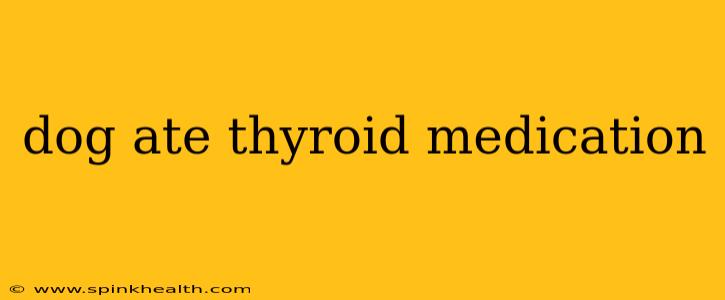The frantic feeling of realizing your dog has gotten into your medication is terrifying, especially if that medication is thyroid medication. This isn't a situation to take lightly. Let's explore what to do if your dog ate your thyroid medication, providing crucial information and steps to take to ensure your furry friend's safety.
Imagine this: You're rushing around, getting ready for work, and you hear a suspicious crinkling sound. You turn to see your mischievous golden retriever, Buddy, with a half-empty pill bottle in his mouth, the telltale white powder scattered around him. Panic sets in. This scenario, while fictional, represents a very real and potentially dangerous situation for many pet owners.
What Should I Do If My Dog Ate Thyroid Medication?
The first and most crucial step is to remain calm. While your heart is probably racing, a clear head is essential for effective action. Immediately:
- Identify the medication: Note the name, dosage, and how many pills your dog ingested. This information is critical for veterinary professionals.
- Check the bottle for contact information: Many medication bottles have a 24/7 poison control hotline number. Call them immediately. They can offer specific guidance based on the medication and your dog's size and breed.
- Contact your veterinarian or an emergency animal hospital: Don't delay. Time is of the essence. Explain the situation calmly and provide all the details about the medication and your dog.
- Do not induce vomiting unless instructed by a professional: This is crucial. Some medications are more dangerous to induce vomiting from than others. Following a vet’s or poison control’s advice is vital to prevent further harm.
- Gather information about your dog: Their weight, breed, age, and any pre-existing health conditions are all important factors your vet will need.
What are the potential dangers of a dog ingesting thyroid medication?
Thyroid medication, typically containing levothyroxine, is designed to replace missing thyroid hormone in humans. However, in dogs, an overdose can lead to a range of serious symptoms, including:
- Hyperthyroidism: An excess of thyroid hormone can cause increased heart rate, restlessness, panting, weight loss, increased thirst and urination, vomiting, and diarrhea.
- Cardiovascular issues: The increased heart rate and metabolic activity can put a strain on the heart, potentially leading to more severe complications.
- Seizures: In severe cases, toxicity can lead to seizures.
What if my dog only ate a small amount of thyroid medication?
Even small amounts of medication can still cause adverse effects, depending on your dog’s size and the strength of the medication. Do not assume it's harmless. Contact your veterinarian or a pet poison control center immediately for guidance. They will assess the risk and advise you on the best course of action.
My dog ate my thyroid medication – how long will it take to show symptoms?
The onset of symptoms can vary depending on the amount ingested, the size of your dog, and the specific medication. Symptoms can appear within hours or, in some cases, may take longer to manifest. Continuous monitoring is crucial. Even if you don't see immediate signs, keep a close eye on your dog for any changes in behavior or physical condition.
What treatment can I expect for my dog?
Treatment will depend on the amount of medication ingested and the severity of the symptoms. Your veterinarian may recommend:
- Induced vomiting (if deemed safe): This will help remove the medication from your dog's system as quickly as possible.
- Activated charcoal: This can help bind to the medication and prevent absorption.
- Intravenous fluids: This is crucial in managing the symptoms of hyperthyroidism.
- Supportive care: This may include monitoring vital signs, managing symptoms, and providing comfort.
How can I prevent this from happening again?
Preventing future incidents requires careful storage of all medications:
- Keep medications in a secure location: This means out of reach and out of sight, preferably in a locked cabinet.
- Use child-proof containers: Even if you don't have children, these containers offer an extra layer of protection.
- Dispose of medications properly: Don't just throw them in the trash. Follow your local guidelines for safe medication disposal.
This information is for general knowledge and does not constitute veterinary advice. If your dog has ingested thyroid medication, seek immediate veterinary attention. Acting quickly can significantly improve your pet's chances of a full recovery. Remember, your swift action is crucial in ensuring the well-being of your beloved companion.

